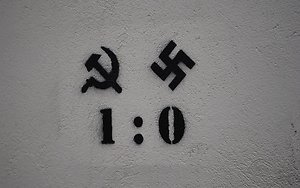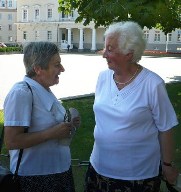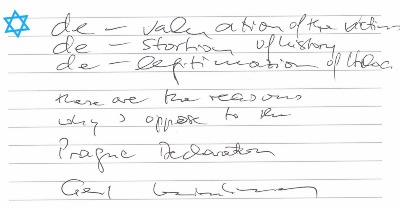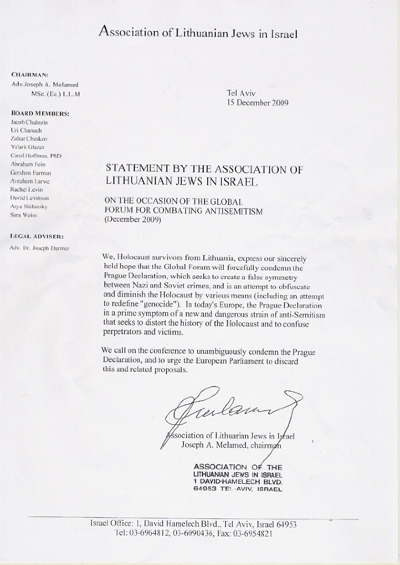DefendingHistory.com has announced the free availability of a frequently updated resource page that provides links for select major expressions of opposition to the 2008 Prague Declaration on European Conscience and Communism. The page is available here or by visiting:
Tag Archives: Prague Declaration
DefendingHistory.com announces Media Chronicle of Opposition to the 2008 ‘Prague Declaration on European Conscience and Communism’
8-12 May 2011 Facebook Debate
Estonian Nationalists say Holocaust ‘Pales’ by Comparison with Soviet Crimes; Delfi.lt produces its ‘Scorecard’ again
Estonian nationalists demonstrating outside Tallin’s Russian Embassy explained their view that ‘The Holocaust pales before the hundreds of thousands of people who were murdered by the Communists, the annihilation of dozens of ethnicities and the mass deportations!’
The BNS report carried by Delfi.lt (English translation here) which contains the quote also reproduced the image of the ‘red-brown scorecard’.

Three Years Later: Neither Charged nor Cleared
 marked three years to the day since police in Vilnius came looking for Holocaust Survivors Dr Rachel Margolis (born 1921, at right of photo) and Fania Yocheles Brantsovsky (born 1922) in a ‘war crimes investigation’ that has still not been publicly closed.
marked three years to the day since police in Vilnius came looking for Holocaust Survivors Dr Rachel Margolis (born 1921, at right of photo) and Fania Yocheles Brantsovsky (born 1922) in a ‘war crimes investigation’ that has still not been publicly closed.
Both women were incarcerated in the Vilna Ghetto from 1941 to 1943. Both lost their entire families to the barbarity of the Nazis and their local collaborators. They both escaped, on different days in September 1943, to join up with the anti-Nazi partisans in the forests of Lithuania. The underground forest fort, a half-hour’s drive from Vilnius, the Lithuanian capital, where Fania lived with another hundred or so Jewish escapees of the Vilna Ghetto, is being allowed to sink into the ground and disappear from history’s view.
March of the Living at Vilnius Mass-Murder Site: Sergey Kanovich Speaks Out
Vilnius-born author Sergey Kanovich (Sergejus Kanovičius) published in today’s issue of Bernardinai a short and powerful statement for the ceremony later today at Ponár (Paneriai), the mass-murder site outside Vilnius where 100,000 civilians, among them 70,000 Jews, were murdered by the Nazis during the Holocaust. Most of the actual shooting was carried out by local Lithuanian units sometimes nowadays glorified as ‘anti-Soviet heroes’ by certain establishment circles, even as a parallel series of Holocaust commemoration activities are produced during this year’s parallel years of commemoration proclaimed in late 2010 by the Lithuanian parliament (see here and here) for 2011, which marks the seventieth anniversary of the events.
“They took your life away. And there are those who continue to try to assassinate your memory — again, today, almost without resistance and with impunity, now and again, the spirit of swastikas and the white armbands of the LAF casts a shadow over Jerusalem of Lithuania. And today there are those who still desire to see your executioners as heroes.”
— SERGEY KANOVICH
Genocide Research Center’s ‘Chief Public Relations Specialist’ Steps Up Antisemitic Campaign
Ričardas Čekutis, the Chief Public Relations Specialist at the state-funded Genocide Research Center who was a leader of the March 11th 2011 neo-Nazi march on the main boulevard of the Lithuanian capital, and was formerly a top parliamentary aide to a Liberal (!) MP, gave a further ‘charming interview’ on April 24th to Diena.lt.
Obfuscationists planning Vilnius Holocaust Museum miles away from the City Center
Rumors are flying in the Lithuanian capital about plans to induce foreign institutions and governments to support the building of a new Holocaust Museum at the mass-murder site Ponár (Paneriai), where no unsuspecting tourist or visitor to Vilnius would ever see it, more than six miles out of town, unless they have prior special interest that would motivate the hiring of a taxi for that purpose.
Reply to Rokas Grajauskas: Condemnation of Communism Does Not Require Submission to Double Genocide, Holocaust Obfuscation, or the Recent Deterioration in Civil Society and Free Speech in Lithuania
O P I N I O N
by Dovid Katz
NOTE: This reply to the Lithuanian Foreign Policy Review paper by Rokas Grajauskas first appeared on the website of LFPR (direct link here).
[UPDATE of 1 March 2013]: The journal refused to publish a reply, but after an intervention from Prof. MEP Leonidas Donskis it was uploaded on the journal’s website for a time, and then removed.]
◊
Rokas Grajauskas cites me in his recent article on these pages as invoking the notion Holocaust Obfuscation (a term I proposed at a London seminar in February 2008, then formally in 2009) to refer to “the efforts of the post-Communist countries to revive the memory of Stalin’s crimes.” Nothing could be further from the truth. The web journal I edit, DefendingHistory.com, although dedicated primarily to the battle against trivialization of the Holocaust and the concomitant racism and antisemitism of the new Far Right in Eastern Europe, contains a page on Soviet crimes, where I wholeheartedly embrace such Council of Europe Parliamentary Assembly resolutions as 1096 (1996) and 1481 (2006), which wisely and rightly condemn Soviet crimes. It is vital that the full extent of these crimes be documented, the victims honored, the subject properly taught in international curricula, museums and memorializing institutions established, and justice pursued to the full extent of law. It is every bit as vital that Western commitment to Baltic security and independence remain unwavering, what with a huge unpredictable neighbor “with a certain past” (and unclear future) situated to the immediate east.
Statement on ‘Double Genocide’ issued by Society for the Promotion of the European Human Rights Model Abroad
In a statement published today on its website, the Society for the Promotion of the European Human Rights Model Abroad takes note of the antisemitic foundations of the new ‘Double Genocide’ movement in Eastern Europe, and particularly in the Baltic states. It also takes the Lithuanian government to task for the 2010 law that effectively threatens imprisonment for those who reject ‘Double Genocide’.
Six Countries Try to ‘Slip in’ Double Genocide in the ‘Stockholm Programme’; European Commission says ‘No’
Lithuania’s Foreign Ministry had announced on 14 December 2010 that it was the initiator of a new demand from six East European countries ― Bulgaria, Czech Republic, Hungary, Latvia, Lithuania, Romania — to Viviane Reding, European Commissioner for Justice, Fundamental Rights and Citizenship, that Double Genocide sentiments, and support for effective criminalization of the view that the Holocaust was a unique genocide, be incorporated in the new Stockholm Programme before the end of 2010. Less than a week earlier, Lithuania’s president took the same demand with her to a meeting in Brussels.
The Road from Prague to Stockholm (via Vilnius?)
Opposition to the 2008 ‘Prague Declaration on European Conscience and Communism’
Critiques of the 2008 Prague Declaration (Select Bibliography)
Jump to 2008 2009 2010 2011 2012 2013 2014
THE PRAGUE DECLARATION AND ITS BACKGROUND
Five Occurences of the word same in the Prague Declaration:
1 “Consciousness of the crimes against humanity committed by the Communist regimes throughout the continent must inform all European minds to the same extent as the Nazi regime’s crimes did”
2 “Believing that millions of victims of Communism and their families are entitled to enjoy justice, sympathy, understanding and recognition for their sufferings in the same way as the victims of Nazism have been morally and politically recognized”
3 “Recognition that many crimes committed in the name of Communism should be assessed as crimes against humanity serving as a warning for future generations, in the same way Nazi crimes were assessed by the Nuremberg Tribunal”
4 “Establishment of 23rd August, the day of signing of the Hitler-Stalin Pact, known as the Molotov-Ribbentrop Pact, as a day of remembrance of the victims of both Nazi and Communist totalitarian regimes, in the same way Europe remembers the victims of the Holocaust on January 27th”
5 “Adjustment and overhaul of European history textbooks so that children could learn and be warned about Communism and its crimes in the same way as they have been taught to assess the Nazi crimes”
Historic Breakthroughs
25 November 2010. For the first time since the Prague Declaration was proclaimed on 3 June 2008, a group of ambassadors has spoken out to oppose ‘Double Genocide’. Opposition to the Declaration has been mounting steadily.
‘Spurious attempts are made to equate the uniquely evil genocide of the Jews with Soviet crimes against Lithuania, which, though great in magnitude, cannot be regarded as equivalent in either their intention or result.’
Excerpt from a letter to leaders of Lithuania from the Vilnius-based ambassadors of Britain, Estonia, Finland, France, Netherlands, Norway and Sweden, 25 November 2010
♦
20 January 2012. European Parliament opposing document:
The Seventy Years Declaration
◊
The Prague Declaration was preceded by perfectly legitimate and noble condemnations of the evils of Soviet communism in the European Union’s institutions, before this movement was hiijacked by the far right’s red-equals-brown campaigners and their government backers in the eastern part of the EU. See: Soviet Crimes.
RELATED: PAGE ON TIMOTHY SNYDER’S BLOODLANDS
2008
Algemeyner Zhurnal (25 July 2008): ‘Will the world remain silent as a new and more cunning form of Holocaust Denial comes before — the European Parliament?’ [in Yiddish] (by Dovid Katz). Part II.
2009
IPS (6 April 2009): ‘Communist ideology, as bad as Nazism?’ (by Zoltán Dujisin).
Guardian (28 September 2009): ‘The Nazi whitewash. I can’t believe Eric Pickles supports Latvia’s “For Fatherland and Freedom” party, which wants to rewrite a murderous history’ (by Efraim Zuroff); alternate link.
Luciana Berger’s Blog (3 October 2009): ‘With friends like these…’ (by Luciana Berger).
OSCE Human Rights Conference in Warsaw (5 October 2009): ‘“Prague Declaration” is a project to delete the Holocaust from European history’ (by Shimon Samuels); press release; alternate link.
Clemens Heni (26 October 2009): ‘The Prague Declaration, Holocaust trivialization and antisemitism’ by Clemens Heni. PDF.
Jewish Chronicle (29 October 2009): UK MP John Mann, chair of the All-Party Parliamentary Group against Antisemitism, calls the Prague Declaration ‘a sinister document’ in his ‘Europe must focus on Baltic hate’.
Jerusalem of Lithuania (Autumn 2009): Milan Chersonski, editor of Jerusalem of Lithuania, publication of the Jewish Community of Lithuania, discusses the renewed government campaign against Fania Yocheles Brantsovsky, librarian of the Vilnius Yiddish Institute, in the context of the red-equals-brown movement in Europe.
 Global Forum for Combating Antisemitism (16 December 2009): Informal statement by German parliamentarian Gert Weisskirchen.
Global Forum for Combating Antisemitism (16 December 2009): Informal statement by German parliamentarian Gert Weisskirchen.
Jerusalem Post (23 December 2009): ‘Of insult and mockery’ by Efraim Zuroff.
2010
Scholars for Peace in the Middle East / SPME (4 January 2010): ‘The Prague Declaration: Antisemitism with a democratic face’ by Clemens Heni. Also on WPK.
The Guardian (8 January 2010): ‘Halting Holocaust obfuscation. The Baltic ultranationalists rewriting east European history as an equal Nazi-Soviet “double genocide” must be stopped’ by Dovid Katz. Republication in Russian.
Warsaw Yiddish Radio, Naye Khvalyes, 31 January 2010): radio interview in Yiddish of Dovid Katz by Katka Mazurczak. Alternate link.
WPK (1 February 2010): ‘Antisemitismus und die Prager Deklaration von Juni 2008’ by Clemens Heni.
Jewish Chronicle (4 February 2010): Simon Round’s interview of Dr Efraim Zuroff.
Connecticut Jewish Ledger (26 February 2010): ‘Conversation with… Dovid Katz’ by Cindy Mindell. PDF.
Clemens Heni’s paper at the Baltic Forum in Riga on 15 March 2010.
Jerusalem Post (2 May 2010): ‘No tolerance for false history’ by Efraim Zuroff.
Tablet Magazine (3 May 2010): ‘The Crime of Surviving’ by Dovid Katz.
HITB (3 June 2010): ‘Contra Prague: Declaration on Unequal Totalitarian Regimes’ by Dovid Katz.
NPD-Blog.Info (21 June 2010): ‘Zuroff: Gaucks Kandidatur “extrem beunruhigend”’.
Jerusalem Post (27 August 2010): ‘A threat to Holocaust memory’ by Efraim Zuroff.
‘Lithuania has taken more than a “walk-on part in British politics”. When the European parliament called on its members, in April 2009, to mark 23 August as the European Day of Remembrance for Victims of Stalinism and Nazism, and when the OSCE, in July 2009, adopted the Vilnius Declaration on increasing awareness of totalitarian crimes, we too became party to the equation of Nazi crimes with those of communism in the Baltic states. By accepting the parallelism, we also have excused collaborators, ignored the unspeakable savageries perpetrated in Lithuania between 1941 and 1945, condoned the pardoning of every single Lithuanian war criminal until today, and endorsed the prosecution of Jewish resistance fighters, whose situation remains unresolved.’
Professor Tessa Rajak (London) in The Guardian (17 Sept 2010)
The Guardian (21 December 2010): ‘Why is the US silent on “double genocide”? While European countries have condemned the new Holocaust revisionism in the Baltics, America shows no moral leadership’ by Dovid Katz. In Russian.
Jewish Chronicle (29 December 2010): ‘EU halts move to downgrade Shoah’ by Michel Zlotowski.
2011
Parliamentary Committee Against Antisemitism (17 January 2011): ‘Never Again’ by Lord Janner of Braunstone. Report here.
House of Commons, UK Parliament (20 January 2011): speech by MP Denis MacShane. Report here.
Letter from the European Commission confirming the negative appraisal of 22 December 2010, regarding attempts to enact ‘Double Genocide legislation’ (21 February 2011). English translation. [A response to Didier Bertin of the Society for the Promotion of the European Human Rights Model]
Society for the Promotion of the European Human Rights Model (25 February 2011): Open letter from Didier Bertin to Viviane Reding, vice president of the European Commission. English translation.
Society for the Promotion of the European Human Rights Model. Selection of documents.
East European Jewish Affairs (vol 41 [December] 2011, no. 3, pp. 207-221): ‘The detonation of the Holocaust in 1941: a tale of two books’ [review of Timothy Snyder’s Bloodlands and Alexander Prusin’s The Lands Between] by Dovid Katz.
2012
Jerusalem Post (28 May 2012): ‘A new dilemma in hosting a German president’ by Efraim Zuroff.
Haaretz, Books Supplement (24 September 2012): ‘Killed by their neighbors’ [review of David Bankier’s Expulsion and Extermination: Holocaust Testimonials from Provincial Lithuania; Frank Buonagunio’s The Last Bright Days. A Young Woman’s Life in a Lithuanian Shtetl on the Eve of the Holocaust; Ellen Cassedy’s We Are Here: Memories of the Lithuanian Holocaust]’ by Efraim Zuroff [PDF of print edition here].
The Times of Israel (15 November 2012): ‘Efraim Zuroff, history’s lonely defender’ by Dovid Katz.
David Williams, Rewriting History. Holocaust Revisionism Today, Hope Not Hate: London 2012.
2013
Website of the Jewish Community of Lithuania (17 January 2013): ‘Instead of truth about the Holocaust — myths about saving Jews’ by Pinchos Fridberg. Also in the Algemeiner Journal (15 January 2013), the Operation Last Chance website of the Simon Wiesenthal Center (19 December 2012), and Defending History (24 December 2012), where links are provided to the publications of the article in the Russian language.
Israel Journal of Foreign Affairs (May 2013). ‘Marek Jan Chodakiewicz, Intermarium: The Land between the Black and Baltic Seas’ reviewed by Dovid Katz.
DefendingHistory.com (27 May 2013): ‘State-sponsored collective memory revisionism; a 21st century incarnation of Holocaust Denial?’ by Dovid Katz [PDF of power point presentation at the Second International Conference on Holocaust Museums and Memorial Places in Post-Communist Countries (in Riga, Latvia)].
Huffington Post (31 May 2013): ‘Truth wins’ by Edward Jacobs.
DefendingHistory.com (15 November 2013): Clemens Heni’s works on the Prague Declaration.
2014
At the end of 2013, in an announcement disseminated mainly in January 2014, the World Union for Progressive Judaism announced it “fully endorses the Seventy Years Declaration. This Declaration, endorsed by 70 European Union parliamentarians who represent all sides of politics, is an attempt to distinguish between the horrors of the Shoah and other crimes against humanity. This has taken on a greater importance since the Prague Declaration of 2008 which attempts to equate the era of Nazism to that of Communist tyranny.”
Apastekhlatroymer: ‘Die Geschichte verteidigen – Defending History’ by Hans Breuer (post of 21 June 2014).
Prague Declaration
Manifesto of the ‘Double Genocide’ and Holocaust Obfuscation movement
See also: Opposition to the Prague Declaration; Proposal for replacement; Statement on Soviet Crimes; The Seventy Years Declaration (+ Section).
♦
The ‘Prague Declaration’ and its preceding and derivative European resolutions are based on ‘Double Genocide’: the proposed ‘equivalence’ of Nazi and Soviet crimes as revisionist history for the European Union. The theoretical constructs for the Double Genocide movement were developed by a number of historians in Eastern Europe, who have themselves on occasion been taken to task by courageous Lithuanian scholars who have exposed these works for what they are (see e.g. the classic review by V. Brandišauskas now available in English translation). Some of the bold dissenting voices from Lithuania are credited on this site’s Bold Citizens page.
♦
The ‘Prague Declaration’ includes the following demands of the European Union:
‘recognize Communism and Nazism as a common legacy’
‘recognition that many crimes committed in the name of Communism should be assessed as crimes against humanity serving as a warning for future generations, in the same way Nazi crimes were assessed by the Nuremberg Tribunal’
‘ensuring the principle of equal treatment and non-discrimination of victims of all the totalitarian regimes’
‘a day of remembrance of the victims of both Nazi and Communist totalitarian regimes’
‘adjustment and overhaul of European history textbooks so that children could learn and be warned about Communism and its crimes in the same way as they have been taught to assess the Nazi crimes’
♦
Chronological Outline of Developments (selection only)
The precursor conference on ‘United Europe, United History’ in Tallinn (22 January 2008). 23 Jan. BNS report on the event, from the website of an Estonian MEP active in the movement (report now removed).
The ‘Prague Declaration’ (3 June 2008) at its own site [update of January 2012: declaration removed from this site which was reassigned to another Prague Declaration; see here for full original text; see here for a 2010 page capture of the original site); alternate link.
The ‘Prague Declaration’ on the website of the ‘International Commission for the Evaluation of the Crimes of the Nazi and Soviet Occupation Regimes in Lithuania’; in Lithuanian.
The European Parliament resolution (2 April 2009) recommends a single mixed ‘Europe-wide Day of Remembrance for the victims of all totalitarian and authoritarian regimes, to be commemorated with dignity and impartiality’ [item 15]. Alternate link.
Incumbent chairman of the European Parliament thanks the Baltic states for educating the West via the red-brown resolutions (28 April 2009).
Proposal in Brussels at a European Parliament conference by the director of the Institute for the Study of Totalitarian Regimes, Czech Republic (14 October 2009). The speaker of the Lithuanian parliament insisted that Europe adopt ‘a single view on the crimes of totalitarian regimes’.
Lithuania’s major news portal Delfi.lt attacks Israel’s president Shimon Peres for differentiating Nazi and Soviet crimes, providing this graphic (14 November 2009).
After the EU’s Dec 2010 repudiation of attempts to insinuate Double Genocide in the Stockholm Programme, the Prague Declaration movement regroups in 2011 under the banner of: The Prague Process, announcing plans for 29 March 2011 meeting and funding under the ‘Europe for Citizens’ program, as well as plans to (abuse) the Hungarian and Polish presidencies of the EU for the red-equals-brown movement.
In 2012, the Lithuanian foreign ministry announces that pursuing in the EU the proposed unification of European history in a red=brown framework would be one of the formal goals of Lithuania’s 2013 rotating presidency of the EU.
♦
Dovid Katz: The “Prague Declaration”: A European attempt to equate Communism with Nazism will falsify history
Reprinted from the Jewish Chronicle (London), 21 May 2009
◊
Not many have heard about the Prague Declaration, which is currently making the rounds at the European Parliament. Proclaimed last June in Prague (but cooked up in the Baltics), its innocuous theme is “European Conscience and Communism”. Now who would oppose that? The heinous crimes of Communist regimes clearly merit full exposure. Victims deserve recognition. When the grand jamboree of freedom, fun and prosperity got under way for us lucky westerners in 1945, entire nations ceded to Stalin were condemned to totalitarian rule.

